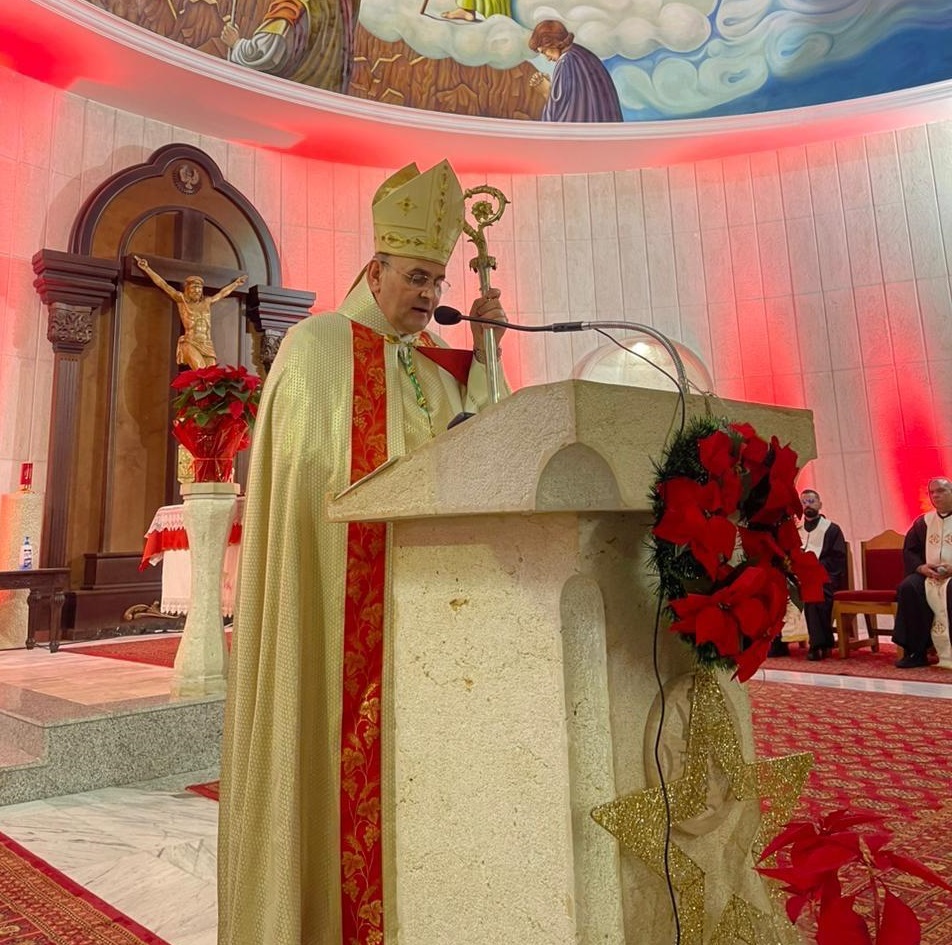Christmas hope among Lebanese Christians at the southern front
Celebrating Midnight Mass in Rmeich and Mass on the 25th in Kley'a, in a relatively stable Lebanon, the Apostolic Nuncio praised the tenacity of the faithful in the Land of the Cedars. And of their attachment to their land, which is ‘holy’. Taking up the pope's words, the exhortation was to ‘never let your hope be stolen’.
Beirut (AsiaNews) - In a Lebanon relatively stabilised by the decision to implement UN resolution 1701 and the fall of the regime of Bashar al-Assad in Syria, the apostolic nuncio Monsignor Paolo Borgia wanted to celebrate Christmas in Rmeich (12,000 inhabitants) and Kley'a (2,500 inhabitants).
These are two Christian-Maronite border towns that have gone through, not without difficulty, the fourteen months of war that Hezbollah waged against Israel in support of Hamas, from 8 October 2023 until the ceasefire on 8 December.
Thanks to the decision to oppose any kind of use by Hezbollah militiamen of their territorial space and human resources, coupled with the close surveillance of this area by skilful and valiant men, the two towns, despite being located ‘in the front row’ of the battlefield, were not directly targeted by the Israeli army during the conflict.
However, they lived in very precarious conditions during the last months of firefights, when the roads became dangerous and foodstuffs and basic necessities had to be transported to the area at great risk.
‘Of course, on the side it is true that we were not directly bombed,’ Fr Tony Elias, parish priest of Rmeich, tells AsiaNews, but “this does not mean that we were not afraid”.
‘Our windows, terraces, walls and the tops of buildings were hit by bullets. Not to mention the shells,' he adds, ’that hit the outskirts of the town and the fallout from the shell interception fire, which damaged six houses and completely destroyed a seventh. If you walk through the streets of the village, you can see that many walls are cracked, split or punctured because of the war'.
The economic consequences of the war have affected Rmeich and Kley'a as much as any other area. ‘Almost 10,000 olive trees,’ the priest explains, ’were destroyed in the fields of Rmeich during the war, not to mention the damage to tobacco cultivation and beekeeping. ‘Two thirds of the inhabitants of Rmeich,’ he recalls, ‘live off the proceeds of the land.
‘Rmeich and Kley'a are accessible by road, without special authorisation from the Lebanese army,’ assures Fr. Pierre Rahi, parish priest of Kley'a. But to reach the two towns, one has to pass through Nabatiyeh, where the old souk, the pride of the inhabitants, was mercilessly destroyed by Israeli air raids. ‘We went through it with a heavy heart, it was pitiful to see all the destruction,’ said the pope's representative.
The Apostolic Nuncio celebrated Midnight Mass in Rmeich and the solemn Christmas Day service in Kley'a. Between one engagement and another, Mgr Borgia tells AsiaNews, ‘I had the joy of seeing the local community united’. ‘For the midnight Mass, the church was packed,’ he continued, not without expressing deep pleasure.
The Holy See representative went on to say that he had witnessed the reality of the Lebanese people's ‘rootedness in faith’, as well as ‘their ability to resist adversity, to remain steadfast and to share’. ‘It is good to see in Lebanon this tenacity, this attachment to the land and to the Christian faith,’ he stressed, not without a hint of pride. ‘For Lebanon, these,’ he concludes, ‘are great signs of hope.
‘Certainly, our relations with the Maronite Archbishop of Tyre are very good,’ resumes the parish priest of Rmeich, who then adds that ’it is comforting to know that we enjoy the direct solicitude of Pope Francis. ‘This is the sixth time that the apostolic nuncio has visited us,’ remarks one of his confreres from Kley'a.
Upon his arrival on 24 afternoon, Mgr Paolo Borgia was welcomed into the convent of the nuns of the Lebanese Maronite Order (Olm), where he spent the night. He first participated in a joyful exchange of gifts and dined surrounded by the guests, before celebrating Mass.
In his homily, the prelate had a thought for all the communities in South Lebanon, for those who were able to stay and those who could not, as well as for those who have lost their homes or cannot yet return.
‘I wanted to celebrate this Christmas Mass here, both because Jesus was born at night, as the Gospel says, and because the night [...] represents,’ the Vatican diplomat observed, ’in some way the uncertainty of today and tomorrow, still full of risks and so many challenges. ‘By my presence, I would like to say,' Mgr Borgia resumes, ’that in this night of life I feel at your side, I feel with all of you, just as the Holy Father, whom I represent in this country, would do.
‘Lebanese Christians have an ancestral faith, rooted in this ‘holy land’ because it was walked by Christ and his disciples,’ he added. ‘A beloved land which, despite everything and thanks to God, you have never left and which you continue to inhabit, proud of your origins. This faith opens your hearts to hope. And as Pope Francis has written: never let your hope be stolen, never give up hope for a future - concluded the prelate - that can always be better than the present, believe in the future, strong in God's support'.
31/07/2006
15/02/2008







.png)










